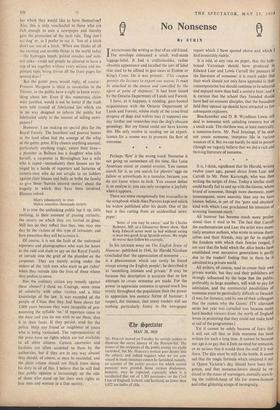No Nonsense
By STRIX
T RECOGNISED the writing as that of an old friend. 'The envelope contained a small, well-made luggage-label. It had a craftsmanlike, rather obsolete appearance and recalled the sort of label that used to be affixed to gun-cases at Euston or King's Cross. On it was printed : 'This coupon permits the licensee to export one moose. It must be attached to the moose and cancelled by the agent at point of shipment.' It had been issued by the Ontario Department of Lands and Forests.
I have, as it happens, a nodding, gum-booted acquaintance with the Ontario Department of Lands and Forests, whose study of the cross-bred progeny of dogs and wolves may (I suppose) one day further our researches into the dog's obscure genealogy. But my friend could not have known this. His only motive in sending me an export- licence for a moose was to promote the flow of nonsense.
Perhaps 'flow' is the wrong word. Nonsense is not going on somewhere all the time, like Latin American music or coastal erosion. You cannot search for it, as you search for plovers' eggs on fallow or arrowheads in a tumulus, because you do not know where to look. You cannot define it, or analyse it; you can only recognise it joyfully when it appears.
There are some exceptionally fine trouvailles in the scrapbook which Alan Parsons kept and which his widow published after his death. One of the best is this cutting from an unidentified news- paper : `Some of you may be aware; said Sir Charles Bathurst, MP, at a Gloucester flower show, 'that King Edward never went to bed without eating at least two good, large Spanish onions. We might
do worse than follow his example.'
In his intricate essay on The English Sense of Humour, published in 1946, Sir Harold Nicolson concluded that 'the appreciation of nonsense . . . is a phenomenon which can rarely be found except among the English people'; he described it as 'something intimate and private.' It may be because this description is accurate that so few attempts to create nonsense are made. For the power to appreciate nonsense is spread much less evenly throughout the population than the power to appreciate less esoteric forms of humour; I suspect, for, instance, that many readers will see nothing particularly funny in the newspaper report which I have quoted above and which I find irresistibly risible.
It is odd, at any rate on paper, that the hide- bound Victorians should have produced in Edward Lear and Lewis Carroll the pioneers of the literature of nonsense; it is much odder that their work should not only have appealed to their contemporaries but should continue to be admired and enjoyed more than half a century later; and it is curious that the school they founded should have had no eminent disciples, that the boundless field they opened up should have attracted so feW subsequent explorers.
Beachcomber and D. B. Wyndham Lewis still deal in nonsense with unfailing resource but oa a small scale. The clerihew was, at least metrically, a nonsense-form. Mr. Paul Jennings, if he does not create nonsense, interprets life in various nuances of it. But we can hardly be said to possess (though we vaguely believe that we do) a rich and thriving literature of nonsense.
* * It is, I think, significant that Sir Harold, writing twelve years ago, passed direct from Lear and Carroll to Mr. Peter Kavanagh, who was then writing the scripts of Bata. Today a similar study could hardly fail to end up with the Goons, whose brand of nonsense, though more daemonic, more inconsequent, more anarchic than any we have known before, is yet of the 'pure and absolute' kind with which Lear proclaimed his intention of arousing 'innocent mirth.' , All humour has become much more profes- sional than it used to be. The fact that Carroll the mathematician and Lear the artist were essen- tially amateur authors, who wrote to amuse them- selves and their friends, may go far to explain the freedom with which their fancies ranged; am sure that the hold which the Alice books have established over successive generations is partly due to the readers' feeling that in them he is admitted to a private world.
All writers, of course, tend to create their own private worlds; but they and their publishers are strongly influenced by the hope that the public, preferably in large numbers, will wish to pay for admission, and the commercial possibilities of nonsense must be particularly difficult to forecast. (I was, for instance, told by one of their colleagues that the reason why the Goons' ITV television series last year was curtailed was because many hard-headed viewers from the north of England wrote in protesting that they could not make head or tail of the programmes.) Yet it cannot be solely because of fears that it will not sell that so little nonsense has been written for such a long time. It cannot be because our age is so gay that it feels no need for nonsense, or so serious that it would shun the stuff if it was there. The djin must be still in the bottle. It seems sad that the magic formula which conjured it out in Queen Victoria's day should have been for- gotten, and that nonsense-lovers should be re- duced to the status of scavengers, eternally search- ing the rubbish-heap of life for moose-licences and other glittering scraps of incongruity.


































 Previous page
Previous page